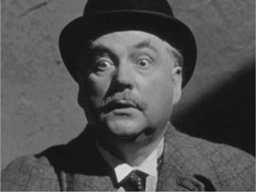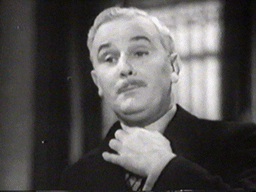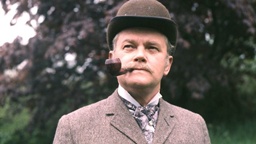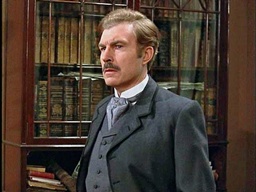The Public Life of Sherlock Holmes: Dr. Watson for Comic Relief?
 For many (especially of a certain age), the image of Doctor Watson is that of a buffoon who provides little assistance and lots of laughs. And the “credit” for that perception can be laid at the feet of Nigel Bruce. Bruce appeared in fourteen popular movies opposite Basil Rathbone’s beloved Holmes, and he also played the good doctor in well over two hundred radio plays – most with Rathbone.
For many (especially of a certain age), the image of Doctor Watson is that of a buffoon who provides little assistance and lots of laughs. And the “credit” for that perception can be laid at the feet of Nigel Bruce. Bruce appeared in fourteen popular movies opposite Basil Rathbone’s beloved Holmes, and he also played the good doctor in well over two hundred radio plays – most with Rathbone.
In the first two films, The Hound of the Baskervilles and The Adventures of Sherlock Holmes, he was a bit of a clown. But after the franchise shifted from Fox to Universal, that portrayal was understated compared to the next twelve movies he made with Rathbone. The scripts called for Bruce to play a dolt – his daughter said that the disappointed Bruce made up the term ‘Boobus Brittanicus’ to describe his un-Doyle like character.
The poem below appeared in Punch Magazine. Unfortunately, after digging through my shelves, I cannot find where I got this from (I thought that it was one of Peter Haining’s books, but that didn’t pan out). But it is from the nineteen forties, when Rathbone was the brilliant, active Holmes and Bruce provided comic relief.
I think it’s both an amusing and insightful commentary on the Bruce phenomenon:
The stately Holmes of England, how beautiful he stood
Long, long ago in Baker Street – and still in Hollywood
He keeps the ancient flair for clues, the firm incisive chin,
The deerstalker, the dressing gown, the shag, the violin.But Watson, Doctor Watson! How altered, how betrayed
The fleet of foot, the warrior once, the faster than Lestrade!
What imbecile production, what madness for the moon
Has screened my glorious Watson as well nigh a buffoon?
Is this the face that went with Holmes on half a hundred trips?
Through nights of rain, by gig, by train, are these the eyes, the lips?
These goggling eyes, these stammering lips, can these reveal the mind
How strong to tread, where duty led, his practice cast behind?His not to reason why nor doubt the great detective’s plan –
The butt, maybe, of repartee yet still the perfect man,
Brace as the British lion is brave, brave as the buffalo,
What to they know of England who do not Watson know?We have not many Sherlocks to sift the right from wrong
When evil stalks amongst us and craft and crime are strong,
Let not the Watsons fail us, the men of bull-dog mould,
Where still beneath the tight frock-coat beats on the heart of gold.Watson, who dared the Demon Hound nor asked for fame nor fee,
Thou should’st be living at this hour. England hath need of thee!
Thus did I muse and muse aloud while wondering at the flick
Till people near me turned and said, ‘Shut up, you make us sick!’

Bruce wasn’t the first less than Canonical Watson on film. Arthur Wontner, the first great ‘talkie’ Holmes, was aided by Ian Fleming in four films, with a switch to Ian Hunter for The Sign of Four. Both were preening, lightweight Watsons who conveyed nothing of Doyle’s stolid, loyal companion. Of course, you read all about Wontner in a prior Black Gate post, right? And Bruce’s scenes (try Sherlock Holmes Faces Death) cemented the image of a goofy Watson on the case.
H. Marion Crawford made some progress in the ‘Take Doctor Watson Seriously’ movement (which didn’t really exist…) when he appeared opposite Ronald Howard in Sheldon Reynolds’ 1955 made-in-France television series (which you surely read about here). Watson was a doofus in some episodes, but he was also intelligent and his physical abilities were useful. He even captured the villain in the first two episodes. Crawford provided a step or two away from Bruce towards Doyle.
In 1959, 50 year old Andre Morell played a somewhat dull but not comedic Watson in Peter Cushing’s The Hound of the Baskervilles (yep, I wrote about that one as well). While I find it a rather pedestrian performance, it was a significant change in how Watson could be portrayed on the big screen. He didn’t have to simply be the comic relief contrast to the dramatic Holmes.

Donald Houston wasn’t too bad in A Study in Terror (Holmes takes on Jack the Ripper), and Nigel Stock seemed like a fawning puppy dog to Douglas Wilmer and then Peter Cushing’s Holmes’ on television.
I’m not going to go through all the Watsons – there would be good (Vitaly Solomon) and bad (Bernard Fox) ones. But that Nigel Bruce image would persist. Until Granada cast David Burke opposite Jeremy Brett for their excellent adaptation of the Canon. Psst… I wrote about Fox’s Hound of the Baskervilles.
In case you missed it, here’s the link to part three of my series on their The Adventures of Sherlock Holmes: it’s got links to the first two parts at the beginning.
Granada wanted an intelligent (but not brilliant), loyal, capable Watson to assist Holmes on his adventures, but to also be his friend. To be fair, Nigel Stock emphasized the latter opposite Peter Cushing, but without emphasizing the usefulness factor enough. Burke was, FINALLY, Doyle’s Watson. I’ve wondered why Rathbone’s Holmes would bother keeping Bruce’s Watson around. Brett and Burke made perfect sense.

Burke left the show after that first season and was replaced by Edward Hardwicke, whom he suggested for the role. Hardwicke, a few years older, continued on with Burke’s revolutionary portrayal. The two men transformed the public image of Watson.
Jude Law played a capable but modern culture-ish, wise-cracking Watson opposite Robert Downey Jr. Some would say he was a good Watson opposite a terrible Holmes. I enjoy the movies, even though Holmes resembles Jason Bourne.
Today, Martin Freeman plays a Canonical Watson opposite Benedict Cumberbatch’s over-the-top Holmes in BBC’s Sherlock. Even though the show jumped the shark with season three, Freeman has remained steady.
And in America, Watson is a woman (Franklin D. Roosevelt had it right!). Lucy Liu is a former neurologist hired to help the drug addled Holmes (Johnny Lee Miller) get right. She’s smart, capable, and intuitive and while she has a sense of humor, she’s certainly not comic relief. We’re talking a brain surgeon here! Elementary is, of course, is miles away from the Canon (as is BBC Sherlock, which wasn’t always that way).
So, it took several decades, but the Nigel Bruce portrayal of Holmes is no longer the standard image of the good Doctor Watson. For me, while I very much like Hardwicke, David Burke is probably my favorite portrayal (check out The Solitary Cyclist episode). And I actually don’t mind watching Bruce in the Rathbone films: I understand the function he serves in the movies. But I certainly don’t see or hear Bruce when I’m writing about Watson.
It’s Elementary – I’m always interested in who authors see and hear when they write Holmes fiction. When I’m working on something a little lighter, I picture Ian Richardson as Holmes. But I always hear Clive Merrison in my head. And for that matter, I often hear Michael Williams’ voice when writing Watson.
You can read Bob Byrne’s ‘The Public Life of Sherlock Holmes’ column here at Black Gate every Monday morning.
He founded www.SolarPons.com, the only website dedicated to the ‘Sherlock Holmes of Praed Street’ and blogs about Holmes and other mystery matters at Almost Holmes.
His “The Adventure of the Parson’s Son” is included in the largest collection of new Sherlock Holmes stories ever published. Surprisingly, they even let him back in for Volume IV!
I know not everyone agrees, but for me, it’s Brett and Hardwicke. Period.
Ouch! It says something for my powers of observation that I never noticed the switch in the Granada Series. I was going to cite ‘Shadowlands’ as an example of Burke’s acting chops, but Warnie (C.S. Lewis’s brother) was played by Hardwicke, not Burke. I read somewhere that casting Holmes is easy. It’s finding the right Watson that’s the tricky part….
Incidentally, I came across this little sketch while browsing the Interweb yesterday and thought it was pretty funny –
https://www.youtube.com/watch?v=eYosZDMIpY4
Aonghus – It took me awhile to be able to actually notice the difference between Burke and Hardwicke in early episodes: especially in some photos.
A bad Watson can destroy a Hound of the Baskervilles…
Never saw that sketch before. Thanks!